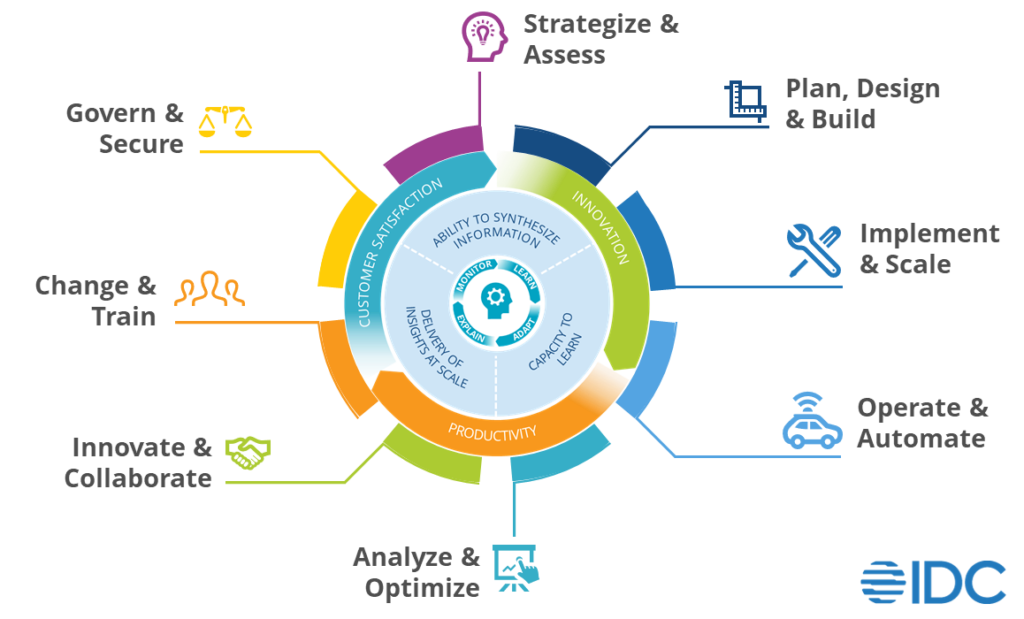The foundation of enterprise intelligence is technology platform that is increasingly being driven by artificial intelligence (AI). IDC has identified three pillars that drive enterprise intelligence: 1) an organization’s ability to synthesize information, 2) its capacity to learn and 3) its ability to apply insights at scale. AI has immense potential to super-charge all three of these pillars. However, most enterprises still struggle with AI, and achieving enterprise intelligence at scale remains a challenge for most organizations.
According to IDC’s 2020 survey of analytics, AI, and RPA services buyers, 80% of respondents said they were at some stage of AI adoption, though most were only in pilots or using AI for limited business functions. Our research shows several significant barriers on the path toward incorporation of AI capabilities to drive greater enterprise intelligence, including:
- Security and privacy
- Data and knowledge management
- Regulatory change
- Cost and budget concerns
- Scarcity of talent in data science, engineering, and solution development
Organizations need to overcome these barriers before they can increase their enterprise intelligence. This is a tall order for most organizations today, who largely are still dealing with siloed processes, technologies, teams, and projects that prevent them from realizing the full value of their investments in AI, data, and knowledge management. When it comes to AI, many enterprises begin AI projects without a clear goal or outcome in mind and fail to integrate them into their current business operations. Projects that looked promising as proofs-of-concept don’t deliver the expected return-on-investment because they didn’t scale. Most enterprises don’t have the skills or experience to know where AI needs to be applied, and where AI won’t deliver results. It is this gap that becomes a clear opportunity for organizations to engage with services providers to help navigate the journey.
AI services firms provide expertise in developing production-grade AI solutions. They also assist with establishing the right organization, platform, governance, process, and talent strategies to ensure AI solutions deliver expected business outcomes.
I recently completed an in-depth assessment of 19 vendors in the worldwide AI services market, evaluating each vendor across 40 distinct scored elements. The analysis looked at both what vendors plan to do (strategies) and their ability to deliver today (capabilities) across the full life cycle of AI services seen in the graphic below.

My assessment included the perception of AI services buyers of both the key characteristics and the capabilities of the vendors evaluated. Based on phone interviews and online surveys of more than 90 organizations across industries, five key attributes emerged as most critical to a successful engagement with an AI services provider:
- Achieving desired business outcomes
- Innovation that produces results
- Explainable and trustworthy AI
- High-quality data sets and pipelines
- Delivery in production at scale
Overall, successful organizations partner with an AI services provider that understands their needs first and shows commitment and capability to achieve their desired business outcomes before pushing a particular technology solution. Other benefits of a strong AI services partnership include creating AI solutions that both align with business goals and are readily adopted by end users, establishing appropriate AI governance frameworks, building a robust yet flexible data foundation for AI training and inference, and addressing the unique characteristics that distinguish AI from traditional software deployments.
In the past two years, most global consulting, systems integration, product engineering, and IT services firms have invested aggressively to improve their offerings, go-to-market, and business models to capture the opportunity in AI services. This has created a market that is very competitive for vendors but also one that is increasingly attuned to the evolving needs of organizations that are adopting AI and other enterprise intelligence technologies. Now is the time to consider partnering with a services provider to make the future of enterprise intelligence a more achievable reality.
Chandana Gopal, IDC Research Director, Future of Intelligence contributed to this blog.
IDC MarketScape: Worldwide Artificial Intelligence Services 2021 Vendor Assessment – May 2021
Success Factors for Artificial Intelligence Services – May 2021
If you would like to learn more about IDC’s “Future of X” practices, visit our website at https://www.idc.com/FoX




